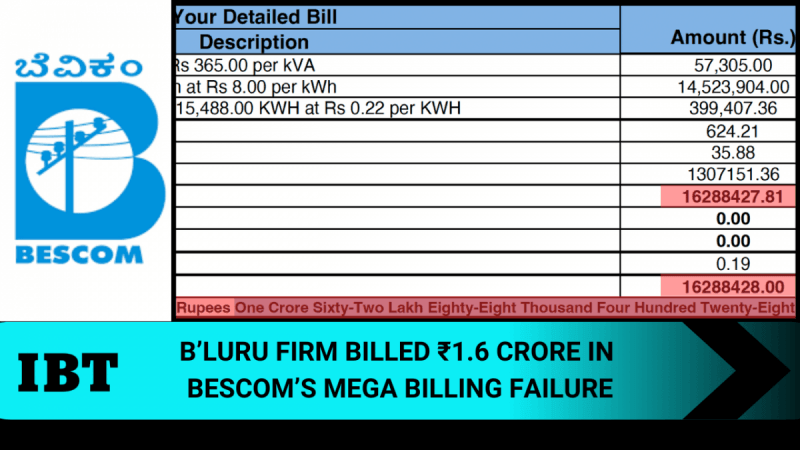
In a shocking incident, a Bengaluru-based tech company received a monthly electricity bill of ₹1,62,88,428 ($1.96 million). The erroneous bill suggested the firm had consumed 1.8 million kWh in a month. BESCOM's billing mistake wasn't a typo—it charged a company for power usage comparable to running a metro system, lighting up an entire city's streets, or keeping a nuclear submarine operational for weeks.
International Business Times reviewed the contents of the power bill, which was a staggering miscalculation by BESCOM officials compared to their actual due of ₹1,96,428 ($2,366). In the bill, the energy charges were billed at Rs 14,523,904, fuel cost adjustment charges at approx. Rs 4 lakh, and total tax at Rs 13 lakh.
A media-tech co. in Bengaluru got a ~₹1.62 Cr bill for “using” 1.8M kWh last month—enough to power 1,000 homes for a year or run a nuclear submarine for weeks.
— Danish Manzoor Bhat (@TellDM) March 6, 2025
You could also buy 50 Maruti Altos or 500 high-end smartphones for that price.
Kudos to @NammaBESCOM for the… pic.twitter.com/1wKGlbqCvc
Speaking to IBT, a company executive said: "We were shocked to receive a ₹1.6 crore electricity bill for our office. Such an error raises serious concerns about BESCOM's billing accuracy and internal checks. If a business had auto-debit enabled, this could have been a financial disaster. While BESCOM corrected the mistake after we flagged it, the fact that such a massive discrepancy went unnoticed is alarming."
This error has raised fresh concerns about the Bangalore Electricity Supply Company's (BESCOM) billing accuracy. Even though BESCOM later corrected the mistake and issued a revised bill upon confrontation, the oversight begs the question: How did a ₹1.6 crore charge not raise red flags? After all, Rs 1.6 crore can get you a luxury flat, a fleet of cars, or a year of first-class world travel.
Not the first time
BESCOM's billing errors have made headlines before. In May 2020, the power utility admitted to faults in at least 900 bills due to spot billing machine errors. Customers were overcharged for two months before corrections were made.

In November 2022, BESCOM's online billing system experienced technical glitches, resulting in inflated charges for thousands of consumers. Users were advised to pay manually as the digital system malfunctioned during a transition between service providers.
By July 2023, discrepancies between online and physical bills had become a major issue. Consumers reported incorrect fuel and power purchase cost adjustments (FPPCA), causing confusion over actual dues.
Many individual incidents have occurred involving BESCOM, but the latest blunder trumps them all with its astronomical figure.
Digital age, analog errors
Despite India's push towards digital efficiency, BESCOM's recurring billing blunders point to a systemic problem. Consumers who rely on automated systems expect accuracy, not multi-crore surprises, especially when BESCOM pushes for an auto-pay system.
Have you had a similar experience with BESCOM or the power authority of any other city? Share your encounters with us at editor@ibtimes.co.in.

















